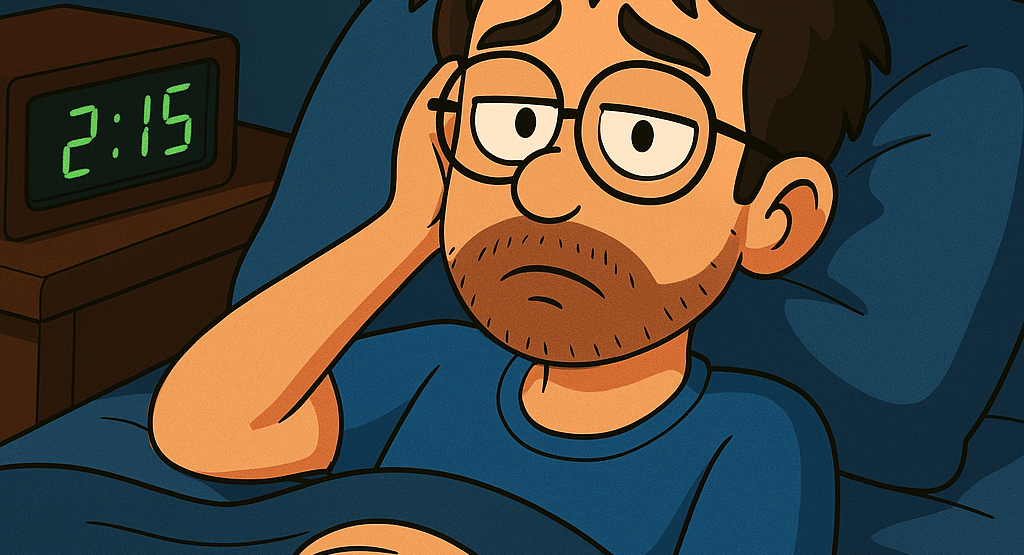Conquering the Night: My Battle with Insomnia (and How You Can Too!)
Description: Struggling to fall asleep or waking up at 3 AM with a racing mind? You're not alone. In this personal and practical post, I share my journey through insomnia — the hidden triggers, the mental toll, and the small changes that made a big difference. From caffeine curfews to building a nighttime sanctuary, I break down the real steps that helped me reclaim my nights. Whether you're a student, a professional, or just tired of being tired, this guide is for you. ✨ Read it. Reflect. Sleep better. 📌 Let’s fight insomnia together — one night at a time.


The 3:00 AM glow of the clock mocks me from across the room. Again. Tossing and turning, counting sheep (or in my case, the cracks in the ceiling), willing sleep to take me – but it's a constant battle. If this scenario sounds familiar, then you, my friend, are a fellow traveler on the frustrating road of insomnia.
Insomnia is more than just an occasional restless night. It's a persistent struggle to fall asleep or stay asleep, leaving you drained and foggy-brained during the day. It can be caused by stress, anxiety, medical conditions, or even bad sleep habits.
For me, it was a combination of factors. Work deadlines loomed, my to-do list seemed to multiply overnight, and the blue light from my phone addiction wasn't helping. But here's the thing – I wasn't alone. Millions of people around the world wrestle with insomnia, and the good news is, there are ways to fight back.
My Struggle with Sleep
I've been struggling with sleep for years. It wasn't always a full-blown battle with insomnia, but sleep just wasn't easy. Sometimes it was difficulty falling asleep, other times it was waking up in the middle of the night, like clockwork, at 3 or 4 am. I knew how important sleep was for my overall health and well-being – for learning, for performing well in different areas of life. But chronic stress seemed to be a constant roadblock.
There was a time, though, at the beginning of this year, when things were different. I fell asleep quickly and slept soundly through the night, waking up refreshed by my alarm clock. It was amazing! I loved my living situation – the room, the bathroom, the internet – everything was perfect. I had great friends, a supportive and amazing girlfriend, and a fantastic roommate who enjoyed my company. Plus, I was studying something I was truly passionate about.
But beneath the surface, unresolved issues from my past lingered. Situations I hadn't been able to fully address, or couldn't address at the moment, kept bubbling up and disrupting my peace. These unresolved issues made it nearly impossible to sleep soundly or get a full night's rest.
Through trial and error, I discovered some things that helped:
Caffeine Management: I learned that caffeine is a big no-no for me, especially later in the day. Now I limit it to the early morning to help me wake up and get going.
Exercise is Key: Regular exercise, at least four times a week, is crucial for me. Skipping workouts is a guaranteed recipe for sleep problems.
Remember, you are not alone in this fight!
Even with these positive changes, there's still work to be done. This is why I'm sharing my story.
Here are some tips that helped me (and hopefully will help you) on the journey to better sleep:
Create a sleep sanctuary: Make your bedroom a haven for sleep. Invest in blackout curtains, keep the temperature cool, and ditch electronics for at least an hour before bed.
Develop a relaxing bedtime routine: Take a warm bath, read a book (not on a screen!), or practice calming breathing exercises.
Stick to a sleep schedule: Go to bed and wake up at the same time each day, even on weekends. This helps regulate your body's natural sleep-wake cycle.
Exercise regularly: Physical activity can improve sleep quality, but avoid strenuous workouts close to bedtime.
Limit caffeine and alcohol: While they may make you feel drowsy initially, they can disrupt sleep later in the night.
Seek professional help: If your insomnia is chronic and impacting your daily life, don't hesitate to talk to your doctor. There are effective treatment options available.
Remember, conquering insomnia takes time and effort. Be patient with yourself, celebrate small victories, and don't be afraid to experiment to find what works best for you. You are not alone in this fight, and a good night's sleep is definitely within reach.
Do you have any tips for battling insomnia? Share them in the comments below!
